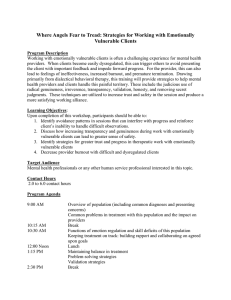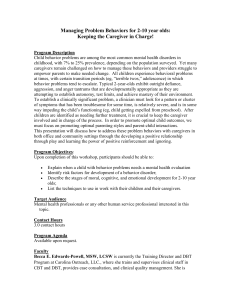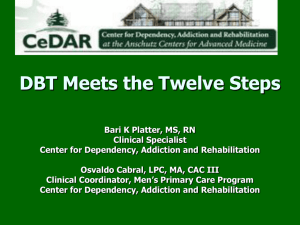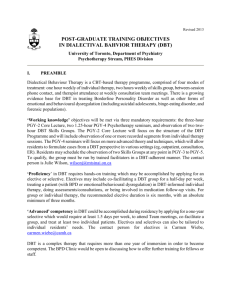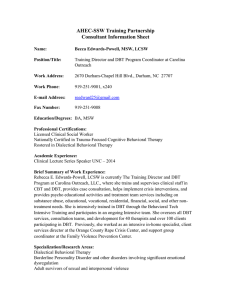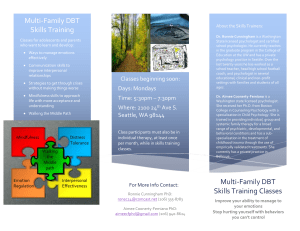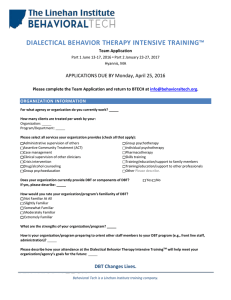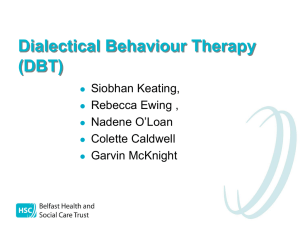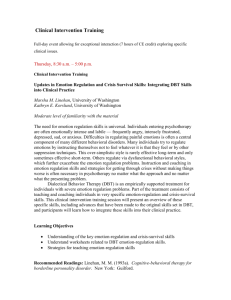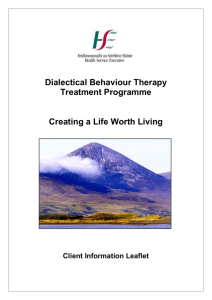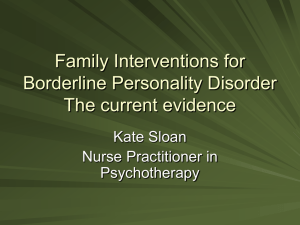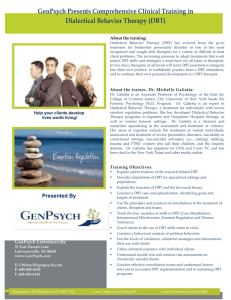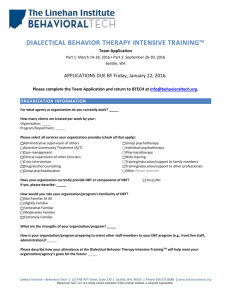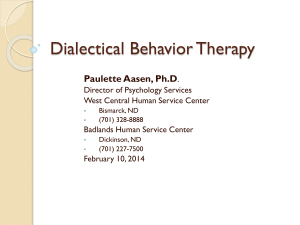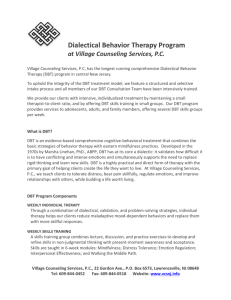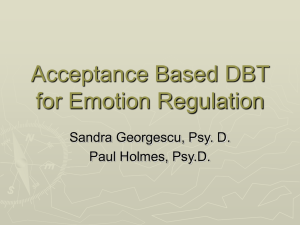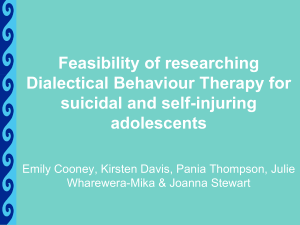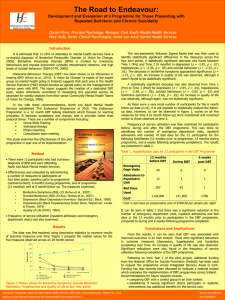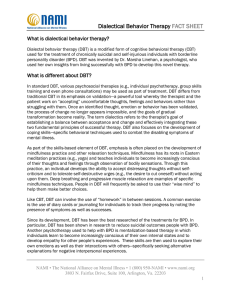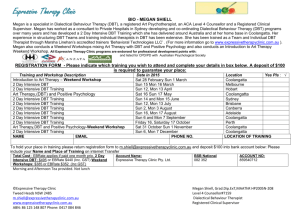Working with Families of Emotionally Dysregulated Clients Feb 5
advertisement
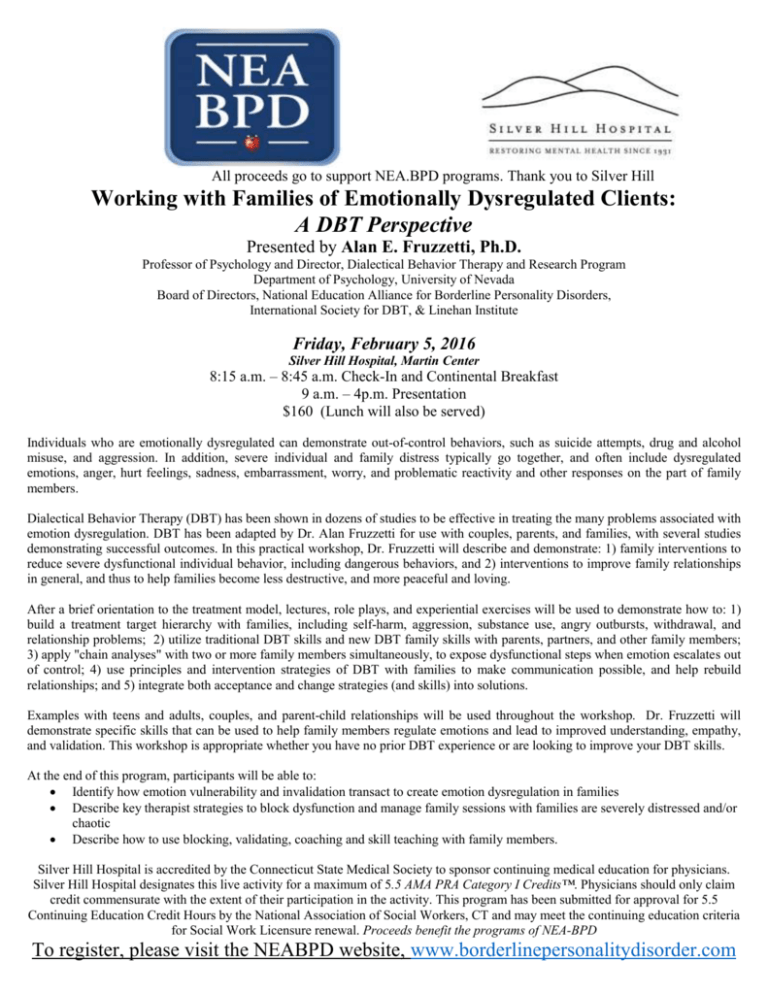
All proceeds go to support NEA.BPD programs. Thank you to Silver Hill Working with Families of Emotionally Dysregulated Clients: A DBT Perspective Presented by Alan E. Fruzzetti, Ph.D. Professor of Psychology and Director, Dialectical Behavior Therapy and Research Program Department of Psychology, University of Nevada Board of Directors, National Education Alliance for Borderline Personality Disorders, International Society for DBT, & Linehan Institute Friday, February 5, 2016 Silver Hill Hospital, Martin Center 8:15 a.m. – 8:45 a.m. Check-In and Continental Breakfast 9 a.m. – 4p.m. Presentation $160 (Lunch will also be served) Individuals who are emotionally dysregulated can demonstrate out-of-control behaviors, such as suicide attempts, drug and alcohol misuse, and aggression. In addition, severe individual and family distress typically go together, and often include dysregulated emotions, anger, hurt feelings, sadness, embarrassment, worry, and problematic reactivity and other responses on the part of family members. Dialectical Behavior Therapy (DBT) has been shown in dozens of studies to be effective in treating the many problems associated with emotion dysregulation. DBT has been adapted by Dr. Alan Fruzzetti for use with couples, parents, and families, with several studies demonstrating successful outcomes. In this practical workshop, Dr. Fruzzetti will describe and demonstrate: 1) family interventions to reduce severe dysfunctional individual behavior, including dangerous behaviors, and 2) interventions to improve family relationships in general, and thus to help families become less destructive, and more peaceful and loving. After a brief orientation to the treatment model, lectures, role plays, and experiential exercises will be used to demonstrate how to: 1) build a treatment target hierarchy with families, including self-harm, aggression, substance use, angry outbursts, withdrawal, and relationship problems; 2) utilize traditional DBT skills and new DBT family skills with parents, partners, and other family members; 3) apply "chain analyses" with two or more family members simultaneously, to expose dysfunctional steps when emotion escalates out of control; 4) use principles and intervention strategies of DBT with families to make communication possible, and help rebuild relationships; and 5) integrate both acceptance and change strategies (and skills) into solutions. Examples with teens and adults, couples, and parent-child relationships will be used throughout the workshop. Dr. Fruzzetti will demonstrate specific skills that can be used to help family members regulate emotions and lead to improved understanding, empathy, and validation. This workshop is appropriate whether you have no prior DBT experience or are looking to improve your DBT skills. At the end of this program, participants will be able to: Identify how emotion vulnerability and invalidation transact to create emotion dysregulation in families Describe key therapist strategies to block dysfunction and manage family sessions with families are severely distressed and/or chaotic Describe how to use blocking, validating, coaching and skill teaching with family members. Silver Hill Hospital is accredited by the Connecticut State Medical Society to sponsor continuing medical education for physicians. Silver Hill Hospital designates this live activity for a maximum of 5.5 AMA PRA Category I Credits™. Physicians should only claim credit commensurate with the extent of their participation in the activity. This program has been submitted for approval for 5.5 Continuing Education Credit Hours by the National Association of Social Workers, CT and may meet the continuing education criteria for Social Work Licensure renewal. Proceeds benefit the programs of NEA-BPD To register, please visit the NEABPD website, www.borderlinepersonalitydisorder.com
